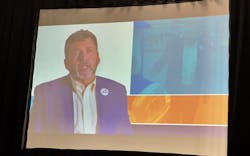SAN DIEGO – Raymond Martinez does not see his position as head of the Federal Motor Carrier Safety Administration (FMCSA) as just regulating the trucking industry.
He believes the way to achieve a higher level of highway safety is through “active collaboration.” That was a phrase he used repeatedly as he spoke Oct. 5 at American Trucking Associations’ Management Conference & Exhibition.
Martinez shared with attendees how he makes a point of sharing how much the industry prioritizes safety when interacting with non-trucking groups. He also took time to praise the Trump’s administrations actions to strengthen the economy and the Department of Transportation’s efforts to decrease regulatory costs across all transport modes by $2.5 billion.
Despite these positives, Martinez also acknowledged it is a “challenging time” and that it is part of FMCSA’s mission to work together with the industry to help “manage change.”
One of the most of significant changes for many motor carriers remains meeting the Dec. 16 deadline to phase out automatic onboard recording devices. Martinez urged any fleets still waiting to transition to electronic logging devices to get it completed "as soon as possible.”
Jim Mullen, FMCSA’s chief counsel, shared the same message in a session a day later. He noted that fleets have technical questions regarding personal conveyance and other “collateral consequences” cause by the mandate. He encouraged executives to “reach out to us directly” to help them address and understand these details.
Martinez stressed that ELDs have the “potential for greatly improving safety” while also reducing fatigue. Likewise, Martinez said he believes safety advancements can be achieved with “a little bit of flexibility” with the hours-of-service rules.
He urged attendees to make sure they file comments by the new deadline of Oct. 21 on the HOS changes proposed earlier this year so the agency can know if they are “on the right track or where improvements can be made.”
To date, about 7,000 comments have already been filed. While many have been in support of the changes, the chairman of the National Transportation Safety Board (NTSB) said he opposes the proposal because there is “no evidence” they will improve highway safety.
Robert L. Sumwalt said NTSB is concerned with the proposal to “weaken many aspects of the HOS rules,” and that ELD mandate is being used as “a rationale for weakening the HOS rules.”
Sumwalt added while NTSB understands fleets value flexibility, “the proposed rules allow hazardous fatigued-driving conditions.”
While it remains to be seen when any changes could be finalized, Martinez outlined a number of other ways the agency is actively taking steps to work closer with the industry. One example is the pilot program get men and women between the ages of 18-20 with certain military experience involved in interstate truck driving.
Martinez recently sent out several thousand letters to fleets across the country, asking them to get involved in this pilot program. He said many members of the U.S. National Guard and U.S. Army Reserves may be looking for work but unaware of this opportunity.
He suggested getting this program successfully off the ground could help generate further support to a broader pilot that could widen the pool beyond just members of the military.
Another ongoing area of collaboration involves efforts to remove non-preventable crashes from carriers’ safety scores. He said 94% of the crashes reviewed under a demonstration program have been deemed non-preventable. He said the agency is considering making the crash preventability determination program permanent.
A new area of collaboration surrounds emerging advanced safety technolgoies such as automatic braking and lane departure systems. Martinez said the two-year program will be backed by DOT's Intelligent Transportation Systems Joint Program Office.
The aim is to encourage innovations and “help those not as plugged in” to understand the benefits and accelerate overall industry adoption.
As he closed his remarks, Martinez shared several public outreach videos that agency has created with the assistance of industry groups including ATA.
One featured Kevin Burch, past ATA chairman and president of Jet Express, who discusses how to share the road safely with commercial vehicles.
About the Author
Neil Abt
Neil Abt is a former FleetOwner editor who wrote for the publication from 2017 to 2020. He was editorial director from 2018 to 2020.

